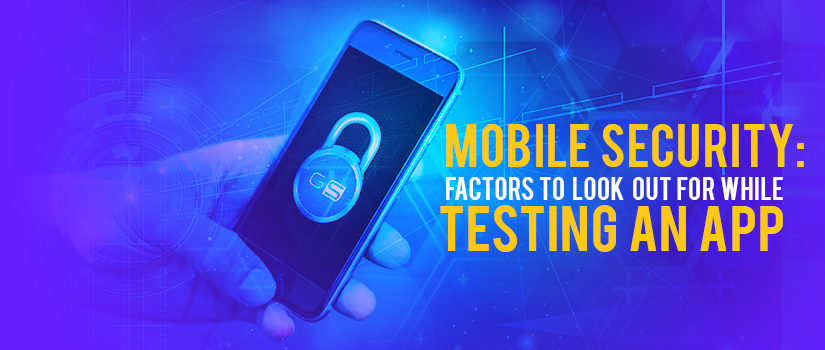Today, we use mobile phones practically for everything from shopping for clothes to performing business activities, so mobile security has prominence than ever.
There are so many apps available in the market that you are confused which is the right one for your needs and also the most secure. Before going to that, you must know about the three basic types of mobile applications:
- Native Applications – mobile applications that run on a specific platform. For example, iOS apps like Health, Voice Memos, and Find iPhone that works on an iPhone.
- Web Applications – these are websites that you can access using any smartphone.
- Hybrid Applications – mobile apps that can be used on different operating systems. Some of the classic examples are Facebook, Instagram, and Twitter.
Here are seven important activities that developers and businesses should perform to check the security of their mobile applications:
- Hack Proof Code
It is common for mobile apps to be attacked with malware and data breaches. It means that developers need to be extra attentive while writing code, which is reliable and free from any backdoors. Robust code is the secret to error-free and hack-proof mobile application, which forms an integral part of its mobile security. One way to test the application’s security is by checking if it doesn’t store, use, or transmit a lot of data.
- Security Features
A mobile app is made for functioning on different systems including Android, iOS, platforms, and devices. While making a hybrid application, the software developer should be careful about features, capabilities, and limitations of different operating systems. It will help the developer to optimize mobile security and make the mobile application hack proof.
- User Permissions
Another way to secure your apps is by putting security measures at the application layer. It helps the app users to stay away from malicious applications by giving them the choice to select the mobile security setting level.
- Third-party Libraries
Many application developers use third-party libraries, but there’s a lot of risk attached to them. They are vulnerable to malicious content, which means developers need to be extra careful from where they source the third-party library. Make sure you test the code before using it for your mobile application.
Also Read : Video Game Testing – Play Games and Earn Money
- Unnecessary Security Risks
Features like social network connectivity are essential for proper functioning of a mobile app; therefore developers should pay particular attention to them while including it in the application. They should be managed in such a way that they don’t slow down the application.
- Backend
A reliable and secure backend system is essential for developing an application. You must know that hackers get into an application mostly through its backend systems, so give it as much as importance you give to the frontend system. It is these little things that when you ignore makes your applications hacker-friendly.
- Strict Testing
Security testing the application might be your least favorite part of the whole development process but it is the most critical one. To reduce the pile of work in the end, perform security testing after completion of each stage of the process, so that testing work is over soon after the development process is. Make sure you develop the mobile application according to national and international security regulations.
Steps involved in security testing of mobile applications:
1. Threat Modelling
In the first step of the process, you identify the threats to your mobile app.
2. Analysis of Vulnerability
In this step, you identify aspects of the mobile application that are vulnerable to be hacked, which are found by tests including Dynamic methods, forensic methods, and Runtime analysis.
3. Information about the Mobile Application
Make sure you gather as much information you can about the mobile app that you’ve developed.
Reasons why Mobile Application Security Testing is an essential part of the Development Process for Companies:
1. Reputation of the Business
No one is going to download apps from a business that is continuously hacked or was hacked in the past. Downtime due to these security breaches could lead to huge amount of loss to any business and thus damaging their reputation in the market. Companies can’t be stubborn and cut costs on application security because it might lead to intangible expenses.
2. Business Mergers
Companies merge all the time because they bring in more business. If you plan to combine your app development company with another, you need to have clear records. It isn’t easy to find vulnerabilities but companies should have a holistic approach to app security.
3. Customer Safety
Mobile application market is expected to grow year-on-year. Customers have a big appetite, so it goes without saying that you need to pay close attention to safety measures taken while developing an app. Application security is as important as quality user interfaces and it’s also a healthy way to attract potential customers.
4. Time is Money
What do you prefer more? Going back to the same application because it gets hacked again and again or develop an app so perfect that is the most hack-proof? With the demand for mobile apps being more than ever, developers are in a race against time to meet deadlines, which only makes it right to make the application that is perfect in all sense.
Let’s say you use a simple application to enter data or calculate interest, which you didn’t test well enough. Hackers get in it and cause a security breach and you might end up losing all your data, some of which will be confidential and might end your business. Hackers will give you a run for money if they crack into many such applications.
The first step to avoiding unnecessary risks is realising the importance of mobile application security. A new way to reduce cybercrimes is by preventing security mistakes in the development stage, which helps in the company’s success and safety of app users.



